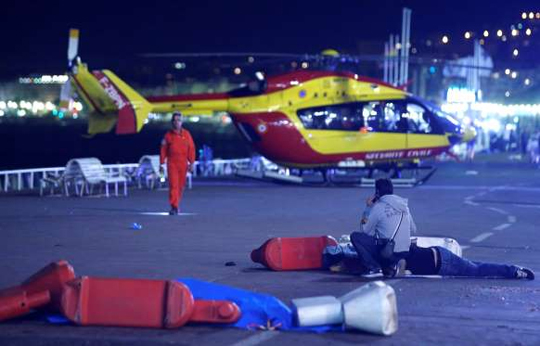Nice (France), Jul 15: A truck ploughed into a crowd in the French resort of Nice, killing at least 84 people today in what President Francois Hollande called a "terrorist" attack on revellers watching a Bastille Day fireworks display.

The driver was shot dead after barrelling the truck two kilometres through the festive crowd on the palm-lined Promenade des Anglais, sending hundreds fleeing in terror and leaving the area strewn with bodies.
Authorities said they found identity papers belonging to a 31-year-old French-Tunisian citizen in the truck, as well as "guns" and "larger weapons".
The attack was of an "undeniable terrorist nature," a sombre Hollande said in a televised national address, confirming that "several children" were among the dead as families came together to celebrate France's national day.
The bloodshed came on Bastille Day, a celebration of everything France holds dear, its secular republic and the values of "Liberte, Egalite, Fraternite" (Freedom, Equality, Fraternity).
The attacker struck after a day of military pomp and ceremony in Paris -- where armed forces, tanks and fighter jets swooped down the Champs Elysees avenue -- and spectacular firework displays.
"France was struck on its national day ... the symbol of freedom," said Hollande. A photograph showed the front of the truck riddled with bullet holes and badly damaged, with burst tyres. A lone doll lay abandoned on the promenade where families celebrated the holiday just hours earlier.
Robert Holloway, an AFP reporter who witnessed the white truck driving at speed into the crowd, described scenes of "absolute chaos". "We saw people hit and bits of debris flying around. I had to protect my face from flying debris," he said.
Interior Minister Bernard Cazeneuve told reporters on the scene that the death toll stood at 84, with scores injured including 18 in "critical condition". The attack is the third major strike against France in less than 18 months and prosecutors said anti-terrorist investigators would handle the probe.
It comes eight months after Islamic State attacks on Paris nightspots left 130 people dead, dealing a hard blow to tourism in one of the world's top destinations.
US President Barack Obama condemned "what appears to be a horrific terrorist attack", although no group had yet claimed responsibility. Hollande announced he would extend France's state of emergency for three months in the wake of this latest attack and "step up" the government's action against jihadists in Syria and Iraq.
He also called up army reservists to bolster the country's security services that are stretched to the limit.






Comments
Countries like USA, Russia, Israel and India are ruled by murderers engaging in destabilizing the world in the name of Islam. Anti Islam agenda is their prime aim.
@comment #3
Boppanna seems to be right going by the number of mindless terror attacks by Muslims. Terror has no religion but the terrorists are always Muslim. Shame on such a bike cult, where the majority abets the criminality of terrorists.
S
Muslims are like cockroaches and have no place in a civilized society.
They should be removed from civil society and put on islands
Moshanba you are the frustrated one not me. Taqiiyya always as usual
I can give u the verses if u want
where are jihadis in mangalore ... hahaha ... zakir naik skype video nodtha ummah ge jai , lakadi pakadi jummah ohh ummah ankondu kootirbeku ... or 4 options jothe population jaasthi madodu helkodtha irbahudu i mean appa amma aata... hahaha ... france incident proves who is real blood thirsty and it is another henious crimes committed by muslims ... very shocking and discgusting ... they can stoop anylevel ... kachada galu ...mekka and madina dalle bomb madagthave andre .. maklu yaav range nalli corrupted mind and frustrated souls agirbeku ...
Being in Saudi Arabia our frustrated Bopanna might not aware of the punishment for twisting the verses of holy quran (blasphemy) .
this is gruesome... some psycho can only do this kind of heinous acts.....but media doesn't have any ryt to put d blame on entire religion.... ISIS does not represent Islam at all....ISIS is not Islam...jus cos few bastards grow beard n waive black flags doesn't mean that they r muslims.....
ISlam is the religion Of Allah,,,, n Allah alone will protect His religion.....
All \peace \" commentators left India to join IS?"
Why are the followers of Religion of \Piece\" not commenting here ?
It's written in the Koran that the month of Ramadan should be one to sow the seeds of terror in the hearts of non Muslims.
Can you tell the truth rather than taqiiyya ?"
Add new comment